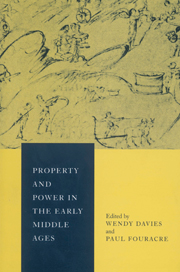Book contents
- Frontmatter
- Contents
- List of maps
- Preface
- List of abbreviations
- Introduction
- 1 The ideology of sharing: apostolic community and ecclesiastical property in the early middle ages
- 2 Teutsind, Witlaic and the history of Merovingian precaria
- 3 Eternal light and earthly needs: practical aspects of the development of Frankish immunities
- 4 The wary widow
- 5 Lordship and justice in the early English kingdom: Oswaldslow revisited
- 6 Adding insult to injury: power, property and immunities in early medieval Wales
- 7 Property transactions and social relations between rulers, bishops and nobles in early eleventh-century Saxony: the evidence of the Vita Meinwerci
- 8 Monastic exemptions in tenth- and eleventh-century Byzantium
- 9 Property ownership and signorial power in twelfth-century Tuscany
- 10 Conclusion: property and power in early medieval Europe
- Glossary
- List of works cited
- Index
4 - The wary widow
Published online by Cambridge University Press: 25 January 2010
- Frontmatter
- Contents
- List of maps
- Preface
- List of abbreviations
- Introduction
- 1 The ideology of sharing: apostolic community and ecclesiastical property in the early middle ages
- 2 Teutsind, Witlaic and the history of Merovingian precaria
- 3 Eternal light and earthly needs: practical aspects of the development of Frankish immunities
- 4 The wary widow
- 5 Lordship and justice in the early English kingdom: Oswaldslow revisited
- 6 Adding insult to injury: power, property and immunities in early medieval Wales
- 7 Property transactions and social relations between rulers, bishops and nobles in early eleventh-century Saxony: the evidence of the Vita Meinwerci
- 8 Monastic exemptions in tenth- and eleventh-century Byzantium
- 9 Property ownership and signorial power in twelfth-century Tuscany
- 10 Conclusion: property and power in early medieval Europe
- Glossary
- List of works cited
- Index
Summary
Over thirty years ago David Herlihy claimed that women between the Carolingian period and the twelfth century played ‘an extraordinary role in the management of family property’. Where Herlihy wrote, cautiously, of women's ‘importance’ and ‘social prominence’, the words often encountered in the more recent historiography are ‘power’ and ‘empowerment’. It may be timely to re-examine women's power over property in a broad context, and also in a narrower one. The present book considers property and power in general. This chapter focusses, first on widows as a particular kind of women, then on a single instance of an aristocratic widow claiming certain powers over property within the specific social context of ninth-century Francia. Gender is a useful category for historians not least because it is a relational term: its use requires, not that we isolate women, but that we analyse complementarity between women and men. For women, when they can be seen, darkly, through the surviving documentary evidence, even when they seem to be acting autonomously, are never acting alone. They appear, above all, in relation to men: biologically, alongside, or against, male kin; sociologically, supported by genuine, or soi-disants, ecclesiastical protectors. Women are deployed as the agents, allies, pawns, of lay kin, and/or of male ecclesiastical communities.
The church looms large in the source material. In the historiography, its role is disputed. Herlihy saw it as protecting and promoting the legal rights of women. Jack Goody has suggested that it deliberately promoted women's capacity to control landed property, so as to benefit, itself, from female generosity.
- Type
- Chapter
- Information
- Property and Power in the Early Middle Ages , pp. 82 - 113Publisher: Cambridge University PressPrint publication year: 1995
- 13
- Cited by



